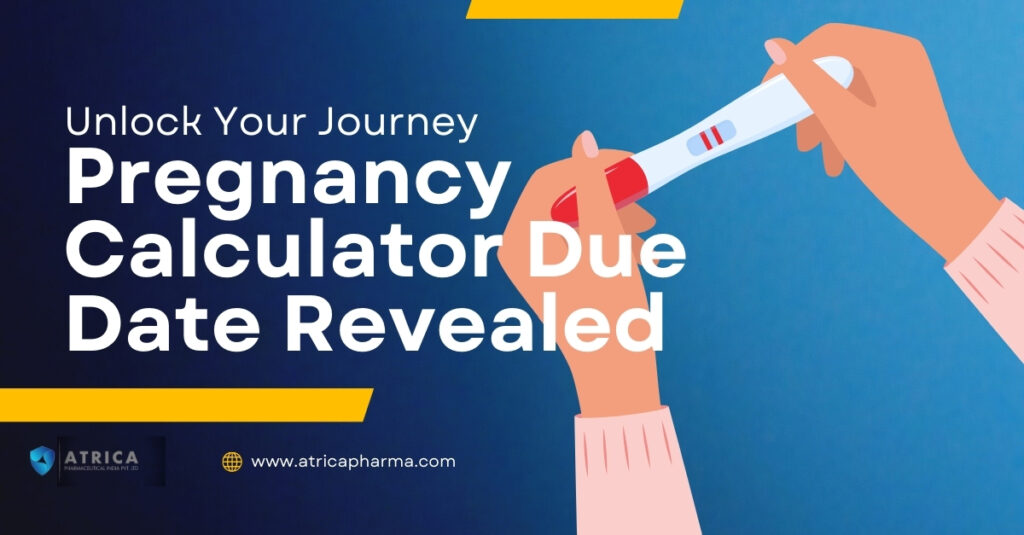
Pregnancy Calculator Due Date Revealed: Unlock Your Journey
Pregnancy Calculator Due Date: Embarking on the path of parenthood is a remarkable journey filled with excitement, anticipation, and a myriad of emotions. At the heart of this journey lies the eagerly awaited due date – a beacon of hope and expectation guiding expectant parents through the wonders of pregnancy. Understanding the significance of this pivotal milestone is akin to unlocking the first chapter of a captivating story, where each passing moment brings forth new revelations and milestones.
The journey towards parenthood begins long before the first flutter of tiny kicks is felt. It starts with the realization of a newfound life blossoming within, accompanied by a flood of emotions ranging from joy to apprehension. Amidst this whirlwind of emotions, the due date stands as a beacon of certainty, offering a tangible timeline to prepare both mentally and physically for the arrival of a precious bundle of joy.

But the due date is more than just a date on a calendar; it signifies the culmination of months of anticipation, preparation, and tender moments shared between expectant parents. It marks the beginning of a new chapter, where dreams of cradling a newborn in loving arms transform into the sweet reality of parenthood.
However, beyond its sentimental value, the due date holds practical significance in guiding healthcare providers to monitor fetal development and ensure the well-being of both mother and baby. It serves as a cornerstone for planning prenatal care, childbirth, and the myriad of decisions that come with welcoming a new life into the world.
The introduction to the pregnancy calculator due date is more than just a mere introduction; it is an invitation to embark on a journey of anticipation, discovery, and unconditional love. It is a reminder that amidst the chaos of life, there exists a beacon of hope – the due date – guiding us towards the most profound and transformative experience of all: parenthood.
Understanding Pregnancy Duration: Unraveling the Intricacies of Gestation

Embarking on the journey of pregnancy entails delving into the intricate tapestry of gestation, where each passing moment is marked by profound changes and miraculous developments. At the heart of this journey lies the duration of pregnancy – a multifaceted phenomenon shaped by a myriad of factors, both physiological and environmental.
Factors Affecting Pregnancy Duration: Navigating the Influences
Pregnancy duration is influenced by an array of factors, ranging from maternal health and genetics to lifestyle choices and environmental influences. These factors intertwine to create a unique gestational timeline for each expectant mother, shaping the course of her pregnancy journey.
Maternal health plays a pivotal role in determining pregnancy duration, with factors such as age, overall health, and pre-existing medical conditions influencing the length of gestation. Additionally, genetic predispositions inherited from both parents can impact the timing of childbirth, contributing to the variability observed in pregnancy duration.
Lifestyle choices, including diet, exercise, and stress levels, can also influence pregnancy duration. Optimal maternal nutrition and a healthy lifestyle promote favorable pregnancy outcomes, while factors such as smoking, substance abuse, and excessive stress may lead to complications and preterm birth.
Environmental factors, such as exposure to pollutants and socioeconomic status, further contribute to the variability in pregnancy length. Women living in socioeconomically disadvantaged areas may face barriers to accessing healthcare and experience higher rates of preterm birth, highlighting the interconnected nature of social determinants and pregnancy outcomes.
Understanding the intricate interplay of these factors is essential for expectant parents and healthcare providers alike, as it enables them to tailor prenatal care and support to individual needs. By addressing underlying factors that may impact pregnancy duration, healthcare professionals can strive to optimize maternal and fetal health outcomes, ensuring a smooth and healthy pregnancy journey.
Variability in Pregnancy Length: Embracing the Diversity
Despite the average duration of pregnancy being around 40 weeks, there exists a considerable variability in gestational length among expectant mothers. While some pregnancies may progress beyond 40 weeks, others may culminate in childbirth earlier than anticipated, highlighting the diverse nature of pregnancy duration.
Factors such as maternal age, parity, and medical history contribute to this variability, with first-time mothers often experiencing longer pregnancies compared to multiparous women. Additionally, variations in fetal growth and development, as well as genetic and environmental influences, further contribute to the range of pregnancy lengths observed.
Understanding and embracing this diversity in pregnancy duration is essential for expectant parents and healthcare providers, as it fosters a holistic approach to prenatal care and support. By recognizing and respecting the individualized nature of each pregnancy journey, we can celebrate the marvels of life and nurture healthy outcomes for both mother and baby.
Importance of Knowing Due Date: Navigating the Path of Preparation

The due date is more than just a date circled on the calendar; it serves as a guiding light illuminating the path of pregnancy, providing expectant parents with a roadmap for preparation and anticipation. Understanding the significance of the due date is paramount, as it plays a pivotal role in shaping the entire pregnancy journey.
Knowing the due date offers expectant parents a sense of certainty and preparedness as they embark on the remarkable journey of pregnancy. It serves as a tangible milestone, marking the culmination of nine months of growth, development, and anticipation. With the due date in hand, expectant parents can begin planning and preparing for the arrival of their little one, both emotionally and practically.
Beyond its symbolic value, knowing the due date is crucial for facilitating optimal prenatal care and monitoring. Healthcare providers rely on the due date to schedule essential antenatal appointments, monitor fetal growth and development, and identify any potential complications that may arise during pregnancy. By staying informed about the due date, expectant parents can ensure they receive timely and comprehensive care throughout their pregnancy journey.
Moreover, the due date serves as a catalyst for bonding and connection between expectant parents and their unborn child. As the due date approaches, parents-to-be eagerly await the moment when they will finally get to meet their little one face to face. This anticipation fosters a sense of closeness and unity, strengthening the bond between parents and their baby before they even arrive.
The importance of knowing the due date extends far beyond mere logistics; it embodies the essence of anticipation, preparation, and unconditional love. By embracing the significance of this pivotal milestone, expectant parents can navigate the journey of pregnancy with confidence, grace, and a deep sense of connection to the life growing within them.
How Pregnancy Calculator Due Date Works: Decoding the Science Behind Estimation
The process of determining a due date involves a meticulous calculation based on various methods, each offering unique insights into the gestational timeline. Understanding how pregnancy calculator due dates work empowers expectant parents with knowledge, enabling them to navigate their pregnancy journey with confidence and clarity.

Methods of Calculating Due Date: Exploring the Options
There are several methods employed by healthcare providers and online pregnancy calculators to estimate the due date accurately. These methods leverage different parameters and measurements to provide an estimation tailored to the individual’s pregnancy journey.
Last Menstrual Period (LMP) Method: Tracing the Origin
One of the most commonly used methods for calculating the due date is the Last Menstrual Period (LMP) method. This approach relies on the assumption that ovulation occurs around 14 days after the start of the menstrual cycle. By tracking the date of the last menstrual period, healthcare providers can estimate the start of pregnancy and subsequently calculate the due date.
Ultrasound Method: Peering into the Womb
The ultrasound method offers a more precise means of estimating the due date by visualizing the developing fetus and measuring its size. During an ultrasound examination, healthcare providers can assess the fetal crown-rump length and other parameters to determine gestational age accurately. This method is particularly useful in cases where the LMP method may be unreliable, such as irregular menstrual cycles or uncertainty regarding the date of conception.
Pregnancy Wheel Method: Spinning Towards Accuracy
The pregnancy wheel, also known as the gestation wheel or pregnancy calculator wheel, is a handheld tool used by healthcare providers to estimate the due date quickly. By aligning the patient’s LMP date with the current date, healthcare providers can determine the estimated due date with ease. While the pregnancy wheel method offers convenience and simplicity, it may not provide the same level of accuracy as ultrasound measurements.
Understanding the intricacies of how pregnancy calculator due dates work empowers expectant parents with the knowledge to navigate their pregnancy journey confidently. By exploring the various methods of calculating the due date, individuals can make informed decisions regarding their prenatal care and preparations for the arrival of their little one.
Accuracy of Pregnancy Calculators: Navigating the Realm of Estimation
The accuracy of pregnancy calculators is a crucial aspect to consider for expectant parents relying on these tools to estimate their due dates. While pregnancy calculators offer a convenient way to track pregnancy milestones and plan for childbirth, it’s essential to understand the limitations and factors that may affect their accuracy.

Limitations and Factors Affecting Accuracy: Unveiling the Challenges
Pregnancy calculators, whether online tools or handheld devices, provide estimates based on certain assumptions and calculations. However, several factors can influence the accuracy of these estimations, leading to variations in the predicted due date.
One of the primary limitations of pregnancy calculators is their reliance on standardized formulas and algorithms to calculate the due date. While these formulas are based on average gestational periods and menstrual cycles, they may not account for individual variations and complexities.
Furthermore, factors such as irregular menstrual cycles, variations in ovulation timing, and uncertainty regarding the date of conception can impact the accuracy of pregnancy calculator estimations. Women with irregular menstrual cycles or those who conceive shortly after their period may find that traditional calculation methods yield less accurate results.
Additionally, pregnancy calculators may not account for certain medical conditions or complications that could affect the timing of childbirth. Conditions such as gestational diabetes, preeclampsia, or intrauterine growth restriction may necessitate adjustments to the estimated due date based on clinical assessments and monitoring.
Moreover, the accuracy of pregnancy calculators may also be influenced by the quality of input data provided by the user. Inaccurate or incomplete information, such as incorrect LMP dates or uncertainties regarding menstrual cycle length, can skew the calculated due date and lead to discrepancies in the estimation.
While pregnancy calculators offer a convenient tool for estimating due dates and tracking pregnancy milestones, it’s essential to recognize their limitations and factors that may affect accuracy. Consulting with healthcare providers and utilizing additional diagnostic methods, such as ultrasound examinations, can help ensure more precise estimations and optimal prenatal care.
Using Pregnancy Calculators Online: Harnessing the Power of Digital Tools
Pregnancy calculators have become invaluable resources for expectant parents seeking to track their pregnancy milestones and estimate their due dates conveniently. With the proliferation of online tools and mobile applications, accessing pregnancy calculators has never been easier. Understanding how to utilize these digital resources effectively can empower expectant parents to navigate their pregnancy journey with confidence and ease.
Popular Pregnancy Calculator Tools: Exploring the Options
There is a plethora of pregnancy calculator tools available online, each offering unique features and functionalities tailored to the needs of expectant parents. Some of the most popular pregnancy calculator tools include:
BabyCenter Due Date Calculator: BabyCenter’s due date calculator is a widely used online tool that provides expectant parents with a personalized estimation of their due date based on their last menstrual period (LMP) date. The calculator also offers additional features such as week-by-week pregnancy guides and personalized pregnancy tips.
The Bump Due Date Calculator: The Bump’s due date calculator offers a user-friendly interface and intuitive design, making it easy for expectant parents to input their LMP date and receive an estimated due date. The calculator also provides informative articles and resources on pregnancy and childbirth.
What to Expect Due Date Calculator: What to Expect’s due date calculator is another popular choice among expectant parents, offering a comprehensive platform for tracking pregnancy milestones and estimating due dates. The calculator provides detailed information on fetal development, prenatal care, and childbirth preparation.
Features and Benefits: Enhancing the Pregnancy Journey
Pregnancy calculator tools offer a wide range of features and benefits designed to support expectant parents throughout their pregnancy journey. Some of the key features and benefits include:
Personalized Estimations: Pregnancy calculator tools provide expectant parents with personalized estimations of their due dates based on their individual menstrual cycle and conception date, helping them plan and prepare for the arrival of their baby.
Educational Resources: Many pregnancy calculator tools offer access to informative articles, videos, and resources on pregnancy, childbirth, and newborn care, empowering expectant parents with knowledge and information to make informed decisions.
Pregnancy Tracking: Pregnancy calculator tools allow expectant parents to track their pregnancy milestones, including fetal development, prenatal appointments, and important milestones such as the first kick or prenatal testing.
Community Support: Some pregnancy calculator tools offer online communities and forums where expectant parents can connect with other parents-to-be, share experiences, ask questions, and seek advice and support throughout their pregnancy journey.
Pregnancy calculator tools offer a convenient and accessible way for expectant parents to estimate their due dates, track their pregnancy milestones, and access valuable resources and support. By leveraging these digital tools effectively, expectant parents can navigate their pregnancy journey with confidence and peace of mind.
When to Use Pregnancy Calculator Due Date: Timing Your Pregnancy Journey
Understanding when to use a pregnancy calculator due date is essential for expectant parents as it helps them make informed decisions and plan for the arrival of their little one effectively. By leveraging the capabilities of pregnancy calculators, individuals can navigate their pregnancy journey with confidence and anticipation.
Early Pregnancy Detection: A Window into Parenthood
One of the key instances when to use a pregnancy calculator due date is during early pregnancy detection. As soon as a woman suspects she may be pregnant, utilizing a pregnancy calculator can provide valuable insights into her potential due date. By inputting the date of her last menstrual period (LMP) or other relevant information, she can receive an estimated due date, laying the groundwork for early prenatal care and planning.
Anticipating Birth Timing: Mapping Out the Journey Ahead
Another crucial moment when to use a pregnancy calculator due date is when anticipating birth timing. Expectant parents eagerly await the arrival of their little one, and having an estimated due date allows them to prepare both mentally and practically for childbirth. By knowing their due date, they can plan for prenatal appointments, make arrangements for childbirth, and ensure they have everything ready for the arrival of their baby.
Knowing when to use a pregnancy calculator due date empowers expectant parents with the knowledge to navigate their pregnancy journey effectively. Whether it’s for early pregnancy detection or anticipating birth timing, leveraging pregnancy calculators can help individuals prepare for the joyous arrival of their little one.
Consulting Healthcare Providers: Partnering for Healthy Pregnancy
Consulting healthcare providers is a pivotal aspect of prenatal care, ensuring the well-being of both expectant mothers and their unborn babies. Understanding the importance of professional guidance and establishing a collaborative relationship with healthcare providers is essential for navigating the complexities of pregnancy with confidence and peace of mind.
Importance of Professional Guidance: Nurturing a Supportive Relationship
Seeking professional guidance from healthcare providers is paramount for expectant parents as it offers a wealth of benefits and support throughout the pregnancy journey. Here’s why professional guidance is indispensable:
Personalized Care: Healthcare providers offer personalized care tailored to the individual needs of expectant mothers, taking into account factors such as medical history, lifestyle, and pregnancy-related concerns. This personalized approach ensures that each expectant mother receives comprehensive care that addresses her specific needs and circumstances.
Monitoring and Assessment: Healthcare providers monitor the progress of pregnancy, tracking fetal development, and assessing maternal health to identify any potential concerns or complications. Regular prenatal appointments allow healthcare providers to intervene promptly if any issues arise, ensuring optimal outcomes for both mother and baby.
Education and Support: Healthcare providers serve as invaluable sources of information, offering guidance and support on various aspects of pregnancy, childbirth, and postpartum care. They provide expectant parents with education on topics such as nutrition, exercise, childbirth preparation, and newborn care, empowering them to make informed decisions and navigate the challenges of parenthood confidently.
Risk Assessment and Management: Healthcare providers conduct thorough assessments to identify any potential risk factors or complications that may arise during pregnancy. By identifying these risk factors early on, healthcare providers can implement preventive measures or treatment strategies to mitigate risks and optimize pregnancy outcomes.
Emotional and Mental Health Support: Pregnancy can be a time of joy, excitement, and anticipation, but it can also bring about feelings of anxiety, stress, and uncertainty. Healthcare providers offer emotional and mental health support, providing reassurance, guidance, and resources to help expectant parents cope with the emotional challenges of pregnancy and parenthood.
Consulting healthcare providers is essential for expectant parents as it provides personalized care, monitoring, education, support, and risk assessment throughout the pregnancy journey. By establishing a collaborative relationship with healthcare providers, expectant parents can navigate their pregnancy with confidence, knowing that they have a trusted partner by their side every step of the way.
Monitoring Pregnancy Progress: Nurturing Growth and Wellness
Monitoring pregnancy progress is crucial for ensuring the health and well-being of both the expectant mother and her developing baby. By tracking milestones and attending regular antenatal appointments, expectant parents can stay informed about the progress of their pregnancy and address any concerns or complications that may arise along the way.
Tracking Milestones: Celebrating Every Step
Tracking pregnancy milestones allows expectant parents to celebrate the remarkable journey of pregnancy and the miraculous growth and development of their baby. From the first flutter of fetal movements to the sound of a strong, healthy and steady heartbeat, each milestone serves as a reminder of the precious life growing within.
As the pregnancy progresses, expectant parents can monitor important milestones such as the development of major organs and systems, the formation of facial features, and the onset of fetal movements. These milestones provide insight into the health and vitality of the developing baby and offer reassurance to expectant parents as they eagerly await the arrival of their little one.
Antenatal Appointments: Partnering with Healthcare Providers
Antenatal appointments play a crucial role in monitoring pregnancy progress and ensuring the health and well-being of both mother and baby. During these appointments, healthcare providers conduct various assessments and screenings to track fetal growth and development, assess maternal health, and identify any potential concerns or complications.
Expectant parents can expect antenatal appointments to include routine checks such as blood pressure monitoring, urine testing, and fetal heart rate monitoring. Additionally, healthcare providers may perform ultrasound examinations to visualize fetal growth and development and assess the overall health of the baby.
Attending regular antenatal appointments allows expectant parents to establish a collaborative relationship with their healthcare providers and receive personalized care and support throughout their pregnancy journey. These appointments provide an opportunity to ask questions, address concerns, and receive guidance on various aspects of pregnancy, childbirth, and postpartum care.
Monitoring pregnancy progress through tracking milestones and attending regular antenatal appointments is essential for ensuring the health and well-being of both mother and baby. By staying informed and engaged in their prenatal care, expectant parents can navigate their pregnancy journey with confidence and peace of mind.
Preparing for Birth: Embracing the Journey Ahead
Preparing for birth is a transformative and deeply personal experience for expectant parents as they anticipate the arrival of their little one. By engaging in careful planning and preparation, they can create a supportive and nurturing environment for childbirth, ensuring a smooth and positive transition into parenthood.
Planning and Preparation: Building the Foundation
Planning and preparation for childbirth encompass a wide range of considerations, from creating a birth plan to assembling essential supplies and making logistical arrangements. Here’s how expectant parents can approach this important aspect of pregnancy:
Creating a Birth Plan: A birth plan outlines the preferences and wishes of expectant parents for labor and delivery, including preferences for pain management, delivery location, and birthing positions. By discussing their birth plan with their healthcare providers and loved ones, expectant parents can ensure that their wishes are respected and honored during childbirth.
Attending Childbirth Education Classes: Childbirth education classes provide expectant parents with valuable information and resources to prepare for labor, delivery, and postpartum care. These classes cover topics such as breathing techniques, relaxation exercises, and pain management strategies, empowering expectant parents to approach childbirth with confidence and resilience.
Assembling Essential Supplies: Expectant parents can prepare for childbirth by assembling essential supplies for themselves and their baby, including maternity clothes, toiletries, and newborn essentials such as diapers, clothing, and feeding supplies. By ensuring that they have everything they need on hand, expectant parents can focus on the birthing experience without unnecessary stress or distraction.
Making Logistical Arrangements: Planning for childbirth involves making logistical arrangements, such as arranging transportation to the hospital or birthing center, coordinating childcare for older siblings, and notifying support persons about the impending birth. By addressing these logistical details in advance, expectant parents can minimize disruptions and focus on the birthing experience.
Preparing for birth is an essential aspect of pregnancy that involves careful planning and preparation. By creating a birth plan, attending childbirth education classes, assembling essential supplies, and making logistical arrangements, expectant parents can approach childbirth with confidence, empowerment, and a sense of readiness.
FAQs: Pregnancy Calculator Due Date
Can Pregnancy Calculators Be Accurate?
Pregnancy calculators utilize various methods and algorithms to estimate due dates based on input data such as the date of the last menstrual period (LMP) or ultrasound measurements. While these calculations can provide a close approximation of the due date, it’s essential to remember that they are estimates and may not always be 100% accurate. Factors such as irregular menstrual cycles, variations in ovulation timing, and uncertainties regarding the date of conception can impact the accuracy of pregnancy calculator estimations.
What if the Due Date Changes?
It is not uncommon for due dates to be adjusted during the course of pregnancy based on additional information or assessments. Healthcare providers may revise the due date following ultrasound examinations or other diagnostic tests that provide more accurate measurements of fetal development. It’s essential for expectant parents to communicate openly with their healthcare providers and trust their expertise in determining the most accurate due date for their pregnancy journey.
Is It Normal for the Due Date to Pass?
It is entirely normal for the due date to come and go without the onset of labor. Due dates are estimates based on calculations and may not always align precisely with the actual timing of childbirth. Most pregnancies last between 37 to 42 weeks, and it’s not uncommon for labor to begin spontaneously within this timeframe. However, if the due date passes without signs of labor, healthcare providers may recommend additional monitoring or interventions to ensure the well-being of both mother and baby.
Can Pregnancy Calculator Predict Labor?
While pregnancy calculators can estimate the due date, they cannot predict the exact timing of labor. Labor onset is influenced by various factors, including hormonal changes, fetal development, and maternal health. While some women may go into labor around their due date, others may experience labor earlier or later than expected. It’s essential for expectant parents to stay informed about the signs and stages of labor and to seek guidance from their healthcare providers if they have any concerns or questions.
How to Deal with Discrepancies in Due Dates?
Discrepancies in due dates may arise due to differences in calculation methods, variations in menstrual cycles, or uncertainties regarding ovulation timing. If expectant parents encounter discrepancies in due dates, it’s important to communicate openly with their healthcare providers and seek clarification. Additional diagnostic tests such as ultrasound examinations can help determine the most accurate due date for their pregnancy journey. Trusting the expertise of healthcare providers and staying informed about the process can help alleviate concerns and ensure a smooth and healthy pregnancy journey.
Conclusion: Pregnancy Calculator Due Date
As we conclude our exploration of pregnancy calculator due date and the journey of pregnancy, it’s important to reflect on the profound significance of this transformative experience. Pregnancy is not merely a biological process; it is a journey of love, anticipation, and growth that shapes the lives of expectant parents and their unborn children in profound ways.
Throughout this journey, pregnancy calculators serve as invaluable tools, providing expectant parents with estimates of their due dates and guiding them through the milestones and challenges of pregnancy. From the excitement of early pregnancy detection to the careful planning and preparation for childbirth, pregnancy calculators offer support and reassurance every step of the way.
However, beyond the technicalities of due dates and calculations lies the heart of the matter – the joy, the anticipation, and the unconditional love that accompany the journey of parenthood. Pregnancy is a time of wonder and awe, as expectant parents eagerly await the arrival of their little one and embrace the miracle of life unfolding within.
As we bid farewell to this chapter and prepare to embark on the next stage of the journey, let us cherish the memories, the milestones, and the moments of connection that define the pregnancy experience. Let us approach parenthood with open hearts, unwavering determination, and a deep sense of gratitude for the gift of new life.
May this journey of pregnancy be filled with blessings, joy, and abundance for all expectant parents, as they prepare to welcome their precious bundle of joy into the world.